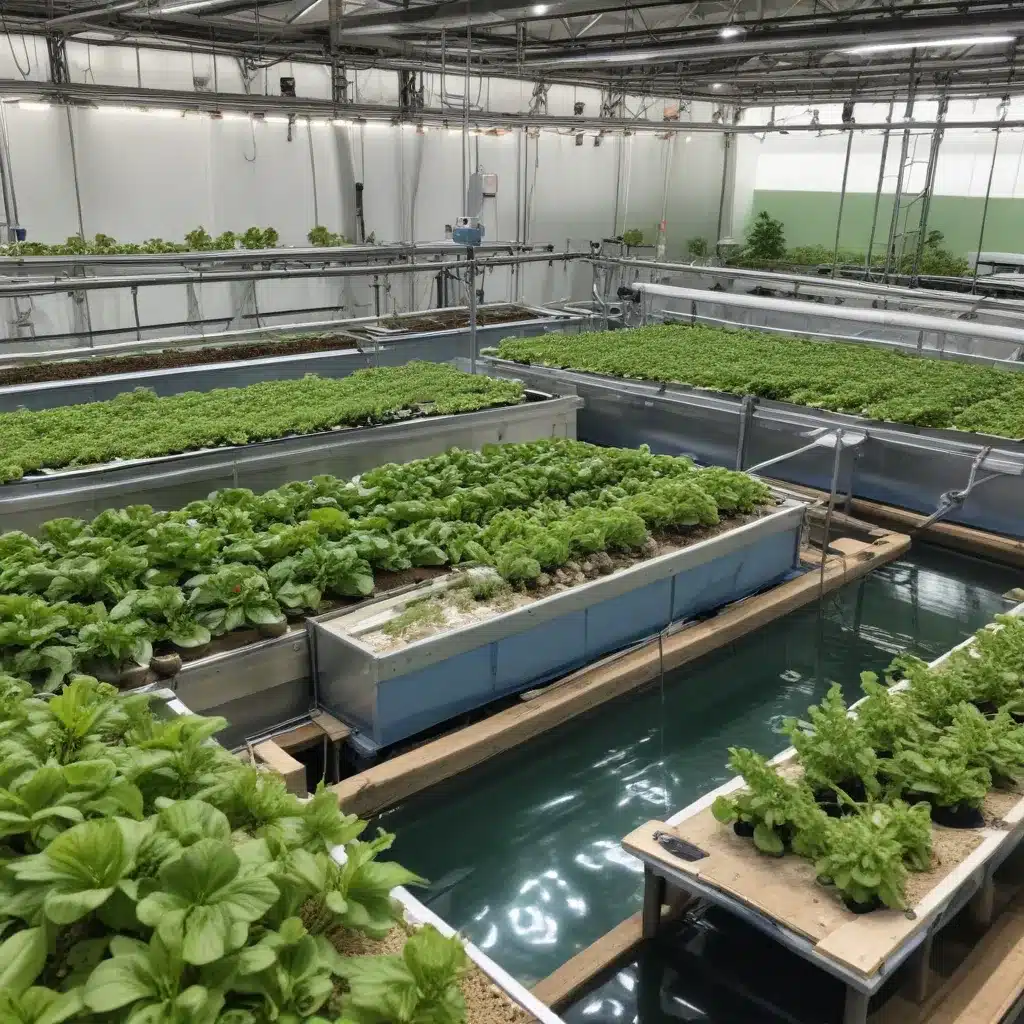
Connected Aquaponics: Sustainable Agriculture through Industry 4.0 Integration
As the global population grows and the impacts of climate change become increasingly apparent, the need for sustainable food production systems has never been more pressing. Aquaponics, a closed-loop system that combines aquaculture (fish farming) and hydroponics (soil-less plant cultivation), has emerged as a promising solution to address these challenges. By integrating the symbiotic relationship between fish and plants, aquaponic systems can dramatically reduce water and land usage compared to traditional agriculture, while also producing nutritious food.
The EDEN project, a collaborative research initiative in Europe, is at the forefront of harnessing the power of Industry 4.0 technologies to enhance the efficiency and scalability of aquaponic systems. By integrating the Internet of Things (IoT), machine learning (ML), and autonomous control systems, the project aims to transform aquaponics into a viable and economically sustainable solution for food production.
Principles of Aquaponics
At the heart of aquaponic systems is a closed-loop process where the waste produced by fish is used as nutrients for the plants, which in turn purify the water for the fish. This symbiotic relationship allows for a significant reduction in water and land usage compared to traditional farming methods. The plants absorb the nitrogen-rich waste from the fish, effectively filtering and cleaning the water, which is then recirculated back to the fish tanks.
The EDEN project is leveraging this closed-loop system to maximize resource efficiency and optimize food production. By carefully monitoring and controlling the key parameters of the aquaponic system, such as water quality, temperature, and nutrient levels, the project team can ensure optimal growing conditions for both the fish and the plants.
Industry 4.0 Integration
The EDEN project is at the forefront of integrating Industry 4.0 technologies to enhance the performance and scalability of aquaponic systems. By incorporating IoT sensors, ML algorithms, and autonomous control systems, the project is developing a comprehensive software framework that can intelligently monitor and adapt the aquaponic system in real-time.
Smart Monitoring and Control
The project’s MAPE-K (Monitor, Analyze, Plan, Execute, Knowledge) framework utilizes IoT sensors to continuously collect critical data, such as water quality, temperature, and humidity. This data is then processed and analyzed by ML algorithms, which can detect anomalies or predict potential issues. When irregularities are detected, the system can alert users and, in some cases, automatically initiate corrective actions through IoT actuators. This adaptive control loop ensures that the aquaponic system can continuously optimize key parameters, such as pH levels, nutrient concentrations, and environmental conditions, for the benefit of both the fish and the plants.
Optimization of Resource Utilization
By leveraging the real-time data and intelligent control mechanisms, the EDEN project aims to maximize the efficiency of aquaponic systems. For example, the automated regulation of pH levels can help maintain a healthy environment for the fish and plants, reducing the need for manual intervention and ensuring a more sustainable operation.
Data-driven Decision Making
Beyond optimizing individual aquaponic systems, the EDEN project is also exploring the potential of networked aquaponic systems. By allowing users to connect and share data, resources, and knowledge, the project is promoting a collaborative approach that aligns with the principles of Industry 5.0, which emphasize collaboration and circularity.
This networked approach enables users to contribute data and models, which can then be used by the entire community to improve system performance and resource efficiency. For instance, an aquaponic farmer can share the data from their pH sensors and manual pH regulation, which other users can then use to initialize an automated pH-regulation model. The trained model can then be provided back to the user community, accelerating knowledge sharing and driving collective improvements.
Sustainable Agriculture Practices
The EDEN project’s integration of Industry 4.0 technologies with aquaponic systems directly supports the principles of sustainable agriculture. By optimizing nutrient cycling, water conservation, and organic cultivation practices, the project aims to create a more environmentally-friendly and economically viable food production system.
Nutrient Cycling
The closed-loop nature of aquaponic systems allows for the efficient cycling of nutrients, reducing the need for external inputs such as chemical fertilizers. The fish waste provides the necessary nutrients for the plants, which in turn purify the water for the fish, creating a self-sustaining ecosystem.
Water Conservation
Compared to traditional agriculture, aquaponic systems can reduce water usage by up to 90%. By recirculating the water within the closed-loop system, the EDEN project is demonstrating how aquaponics can contribute to water conservation efforts, particularly in regions facing water scarcity.
Organic Cultivation
The absence of soil in aquaponic systems eliminates the need for synthetic pesticides and herbicides, allowing for the production of organic, chemical-free crops. This aligns with the growing consumer demand for sustainably-grown, nutritious food options.
Conclusion
The EDEN project’s integration of Industry 4.0 technologies with aquaponic systems represents a significant step forward in the pursuit of sustainable agriculture. By leveraging the power of IoT, ML, and autonomous control systems, the project is optimizing the efficiency and scalability of aquaponic farming, making it a viable solution for addressing global food security and environmental challenges.
As the world continues to grapple with the impacts of climate change and the ever-increasing demand for food, initiatives like the EDEN project offer a glimpse into the future of agriculture. By seamlessly blending innovative technologies with sustainable practices, the project is paving the way for a more connected, resource-efficient, and environmentally-responsible food production system that can benefit communities across Europe and beyond.
To learn more about the EDEN project and its contributions to the future of sustainable agriculture, visit the European Future Energy Forum.







